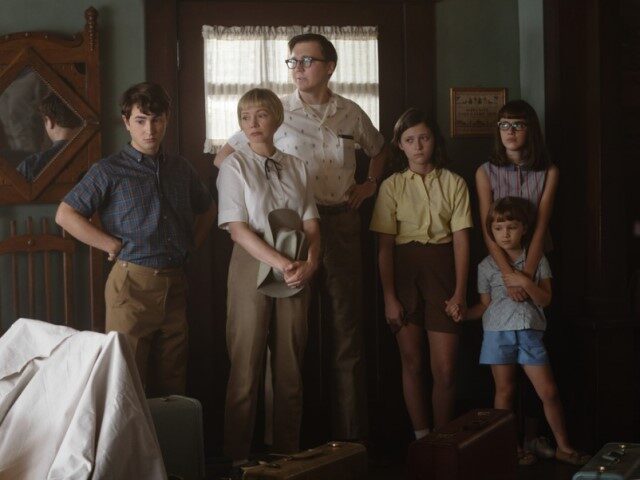The fact that The Fabelmans has won several Oscar nominations and that Steven Spielberg is considered a shoo-in to take home Best Director only proves one thing: Hollywood really likes Steven Spielberg.
I’m good with that. I like Spielberg. But I sure don’t like The Fabelmans.
Co-written by Spielberg with Tony Kushner, The Fabelmans is a somewhat fictionalized account of Spielberg’s childhood, from age six to about age 20. The story opens with young Sammy Fabelman hypnotized by the train crash in Cecil B. DeMille’s Best Picture winner, The Greatest Show on Earth (1952). This launches Sammy’s love of movies and a desire to make his own. When we leave Sammy, he will finally get a little bit of his foot into Hollywood’s door.
In between these director-in-training moments, we meet Sammy’s family. Mom (Michelle Williams) is flighty and selfish because she gave up her dreams of being an artist. Dad (Paul Dano) is a loving egghead missing his masculinity gene. There are two sisters, Seth Rogen’s “Uncle” Benny, Judd Hirsch’s Great-Uncle Boris, a lot of bad acting, and not a single scene that feels real.
Not for a moment did I believe anything that happened in The Fabelmans, and like all movies today, I went into this with low expectations. In other words, I was an easy lay. Unfortunately, everything — the locations, sets, characters, performances, and most especially their relationships — felt as contrived, artificial, and on the-nose as the movie’s title. For example, Paul Dano and Seth Rogen play two guys who are supposed to be the best of friends, but they have no chemistry, no warmth, and no sense of history. These guys aren’t best friends. They are two actors who met today pretending to be best friends.
As he did in those two Independence Day films, Judd Hirsch doesn’t play an old Jewish guy, he plays an old, VERY Jewish guy, and the much-lauded scene that won Hirsch an Oscar nomination is actually a low point. Why not call him Uncle Exposition or Uncle I’m-Here-To-Explain-The-Theme? No one talks like that. That’s not Hirsch’s fault. Watch Running on Empty (1988) or Ordinary People (1980). Hirsch is an actor whose very presence delivers depth and reality. His Fabelmans scene feels like a Carol Burnett Show sketch.
Even worse is Sammy’s heart-to-heart with one of his sisters (played by Julia Butters). We’re supposed to believe she’s a little girl with an insight into human nature that rivals Plato. Worst of all is the prom scene where Sammy and his bully discuss the power of cinema. It’s so ridiculously contrived; I wouldn’t believe it coming from a Hitchcock/Truffaut (2015) outtake.
As far as Michelle Willaims, I get that her character is supposed to be theatrical, but like the rest of the Fabelman family, like the sets and various locations, she never felt authentic or lived in. You can argue that that’s the point. But the counter-argument is that Blanche DuBois is a “theatrical” character who felt plenty lived-in in the hands of Vivien Leigh. Paul Dano’s dad had the same problem — no dimension, no depth: just a blah, a caricature.
Even the movie’s driving theme is forced: art vs. science, romance vs. duty, dreams vs. discipline… It certainly doesn’t help that we’re told more than once what this theme is.
Every scene came off not like it was filmed in a studio but like it was staged in a catalog. Camping has never looked so tidy. Like the characters, none of the locations feel lived-in. This is especially disappointing from the director of E.T. and Close Encounters, two movies about fractured families filmed in homes filled with impressive details. This memorable granularity made every moment real and relatable.
Especially artificial is the fact that The Fabelmans takes place during the ’50s and ’60s, and I don’t remember seeing a single cigarette.
Two actors do manage to overcome the contrived melodrama and sterility. Chloe East knocks it out of the park as Sammy’s Jesus-loving girlfriend. Every one of her scenes is a delight because she is a delight, an actress who can give her character an inner life with no help from the script. Unlike the other characters, you believe this character exists when she’s not on camera. David Lynch is just as great in his one-shot as director John Ford. Spielberg recreates an anecdote he’s told many times about meeting the legend, and Lynch comes through and then some.
Obviously, this goes without saying in the year 2023, but the movie’s length is another problem. Dr. Strangelove (1964) is 94 minutes long. Did we really need to spend 151 minutes with Sammy Fabelman?
No.
Steven Spielberg turns 77 this year and has more than earned the right to spend forty million of Universal’s dollars on his own personal Amarcord (1973). But Fellini was smart enough to stylize his childhood memories into something poetically (and memorably) off-center. The warmth and fun-loving spirit never feels phony, even though it is. Why? Because Amarcord plays like a dream, like the way Fellini wants to remember it — you can’t help but be drawn in and charmed. The Fabelmans feels like a staged recreation, a soulless, mediocre, episodic, overlong TV movie… It’s a real shame.
The Fabelmans is available on home video.
Follow John Nolte on Twitter @NolteNC. Follow his Facebook Page here.

COMMENTS
Please let us know if you're having issues with commenting.